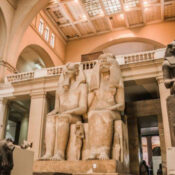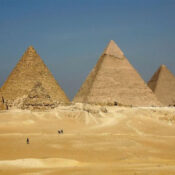Exploring Egypt’s Modern Culture: How the Past Shapes the Present

Exploring Egypt’s Modern Culture: How the Past Shapes the Present
Please give me a moment to prepare it.
Egypt is a country where the ancient past seamlessly blends with the dynamic present. While Egypt is globally known for its rich historical sites like the pyramids and temples, modern Egyptian culture is equally captivating, characterized by a unique fusion of traditions, languages, and lifestyles. In this blog, we will explore how Egypt’s ancient history continues to influence its modern culture and how you can experience this blend firsthand with Hurghada Horizons.
The Legacy of Ancient Egypt in Today’s Society
The Influence of Ancient Egypt on Modern Identity
Ancient Egypt’s civilization spanned thousands of years, leaving an indelible mark on the country’s cultural identity. Modern Egyptians take pride in their rich history, and this is evident in the way they integrate ancient symbols, myths, and rituals into daily life. From the ankh (the symbol of life) worn as jewelry to the storytelling traditions rooted in ancient myths, the past continues to shape contemporary Egyptian identity.
Preserving Historical Monuments
One of the most apparent ways Egypt’s past influences its present is through the preservation of historical monuments. The Great Pyramids of Giza, the temples of Luxor, and the Valley of the Kings are not just tourist attractions; they are cultural heritage sites that Egyptians feel a deep connection to. Preservation efforts, supported by both the government and international bodies, underscore the importance of these monuments in defining Egypt’s modern cultural landscape. Exploring these sites with Hurghada Horizons provides travelers with a glimpse into how the ancient and modern worlds coexist.
Language: A Bridge Between the Past and Present
The Evolution of the Egyptian Language
The Egyptian language has undergone several transformations, from the ancient hieroglyphs and Coptic scripts to the modern Arabic spoken today. Despite the dominance of Arabic, traces of ancient Egyptian language remain, especially in religious contexts. For example, the Coptic Church, one of the oldest Christian communities, still uses Coptic, derived from ancient Egyptian, in its liturgical practices. This continuity highlights how language serves as a bridge connecting Egyptians with their ancestral roots.
Modern Egyptian Arabic and Its Unique Characteristics
Modern Egyptian Arabic, or Masri, is the most widely spoken dialect in Egypt and is heavily influenced by various languages due to historical conquests and trade. Words from Greek, Turkish, Italian, and French have been integrated into daily speech, making the dialect a living testament to Egypt’s diverse historical influences. Engaging with locals while exploring the country with Hurghada Horizons offers a unique opportunity to experience this linguistic richness.
Traditional Arts and Crafts: Echoes of Ancient Practices
The Art of Pottery and Glassmaking
Egypt’s art scene is a direct descendant of ancient craftsmanship. Pottery, a skill that dates back to the time of the pharaohs, is still practiced today, especially in regions like Fayoum. Egyptian glassmaking, once considered a mystical and sacred art form, has also endured through the centuries. Modern artisans use similar techniques to create beautiful pieces that are sold in local markets and tourist shops.
Textile Weaving and Embroidery
Textile production, especially in areas like Siwa Oasis and Upper Egypt, has a rich heritage. Ancient Egyptians were among the first to weave linen from flax. Today, traditional weaving techniques are preserved in rural areas where locals create intricate patterns on fabrics. These textiles are not only practical but are also a symbol of cultural identity and artistic expression.
Religion: An Ever-Present Force in Egyptian Culture
The Role of Islam and Christianity
Religion plays a significant role in shaping modern Egyptian culture. Islam, introduced in the 7th century, and Christianity, established even earlier, coexist in Egyptian society, contributing to a unique cultural blend. The daily call to prayer, the celebration of Islamic holidays, and the presence of ancient Coptic churches are vivid reminders of the country’s religious diversity.
Ancient Religious Influences in Modern Practices
Interestingly, many practices and beliefs from ancient Egyptian religion have found their way into modern traditions. For instance, the ancient Egyptian belief in the afterlife has parallels in contemporary religious views on life and death. Additionally, symbols like the Eye of Horus are still used as protective talismans, highlighting the enduring influence of ancient religious iconography on modern spiritual practices.
Food: A Culinary Journey Through Time
Traditional Egyptian Cuisine
Egyptian cuisine is a flavorful blend of ancient traditions and modern influences. Dishes like koshari (a mix of rice, lentils, pasta, and tomato sauce), ful medames (cooked fava beans), and molokhia (a green leafy soup) have roots tracing back to pharaonic times. These recipes have been passed down through generations, reflecting the country’s agricultural history and the influence of various cultures.
The Influence of Mediterranean and Middle Eastern Flavors
The flavors of Egypt are influenced by its geographic location, bridging Africa, the Mediterranean, and the Middle East. The use of spices like cumin, coriander, and cinnamon creates a unique flavor profile in Egyptian dishes. Exploring local eateries and street food markets with Hurghada Horizons is an excellent way to taste the fusion of ancient and modern culinary traditions.
Modern Music and Dance: A Nod to the Past
Traditional Folk Music and Instruments
Egypt’s music scene is diverse, ranging from traditional folk music to contemporary pop. Instruments like the oud (a type of lute) and the darbuka (a goblet drum) have been used since ancient times and are still popular today. These traditional sounds are often blended with modern musical styles, creating a unique genre that is distinctly Egyptian.
The Rise of Contemporary Egyptian Pop and Hip-Hop
In recent years, contemporary Egyptian music has seen the rise of pop and hip-hop artists who draw inspiration from traditional melodies and rhythms. Artists often incorporate ancient themes and stories into their lyrics, connecting the past with the present. This fusion of old and new resonates with the younger generation, showcasing how Egypt’s cultural heritage continues to inspire modern creativity.
Modern Fashion with Ancient Roots
The Resurgence of Traditional Clothing
While Western-style clothing is prevalent in Egypt’s urban areas, traditional attire has seen a resurgence in recent years. Many Egyptians are embracing garments that reflect their cultural heritage, such as the galabeya (a long, loose robe) and the hijab with intricate embroidery. This trend is a way for people to express pride in their roots and preserve their cultural identity.
Incorporating Ancient Egyptian Symbols in Modern Fashion
Fashion designers in Egypt have started incorporating ancient Egyptian symbols and motifs into their collections. From jewelry featuring the Eye of Horus to clothing embroidered with lotus flowers, these designs are a nod to Egypt’s rich history. Shopping in local markets or boutiques with Hurghada Horizons gives tourists a chance to find unique pieces that blend ancient aesthetics with modern style.
Festivals: Celebrating Egypt’s Cultural Heritage
Traditional Festivals Rooted in Ancient Customs
Egypt’s calendar is filled with festivals that celebrate its rich cultural heritage. Sham El-Nessim, a spring festival dating back to ancient Egypt, is still celebrated today with picnics, flowers, and painted eggs. Similarly, the Islamic holiday of Moulid involves traditional processions and music that have their roots in ancient Egyptian festivals, demonstrating how old customs continue to thrive in modern times.
Contemporary Festivals Showcasing Modern Culture
In addition to traditional festivals, Egypt hosts contemporary events that showcase its modern culture. The Cairo International Film Festival and the Egyptian Fashion Week are platforms where local and international artists present their work, blending traditional themes with modern creativity. These events highlight the dynamic and evolving nature of Egyptian culture.
Tourism: Experiencing Modern Egypt with Hurghada Horizons
The Rise of Cultural Tourism
Cultural tourism has become a significant aspect of Egypt’s tourism industry. Visitors are not only interested in ancient sites but also in experiencing the country’s contemporary culture. Hurghada Horizons offers curated tours that combine visits to historical landmarks with opportunities to experience modern Egyptian life, such as exploring local markets, attending cultural festivals, and participating in traditional crafts workshops.
Sustainable Tourism and Community Involvement
Modern tourism in Egypt is increasingly focused on sustainability and community involvement. Efforts are being made to ensure that tourism benefits local communities and preserves the country’s cultural heritage. Initiatives like eco-friendly tours and community-based projects are part of Hurghada Horizons’ offerings, allowing travelers to experience Egypt responsibly and support local development.
Media and Film: Reflecting Egypt’s Evolving Society
The Influence of Egyptian Cinema
Egyptian cinema, often referred to as the “Hollywood of the Middle East,” has played a pivotal role in shaping modern culture. Egyptian films have historically been a mirror of society, reflecting its joys, struggles, and the ongoing dialogue between tradition and modernity. Iconic films like “The Yacoubian Building” highlight the complexities of contemporary Egyptian life while still nodding to the past.
Social Media and the Digital Age
The rise of social media has significantly influenced modern Egyptian culture. Platforms like Instagram, YouTube, and TikTok have become spaces where Egyptians, especially the youth, express their creativity and share aspects of their daily lives. This digital transformation has made it easier for people worldwide to engage with and learn about Egypt’s vibrant modern culture.
Conclusion: Embracing the Old and the New with Hurghada Horizons
Egypt’s modern culture is a fascinating blend of ancient traditions and contemporary influences. The country’s ability to honor its rich history while embracing modernity creates a unique cultural landscape that is both timeless and ever-evolving. For travelers, this means an opportunity to experience a multifaceted culture that offers more than just ancient monuments.
With Hurghada Horizons, visitors can dive into this cultural tapestry, exploring everything from historical sites and traditional crafts to modern art scenes and culinary delights. Whether you are strolling through bustling markets, enjoying local music, or participating in a traditional festival, Egypt’s vibrant




